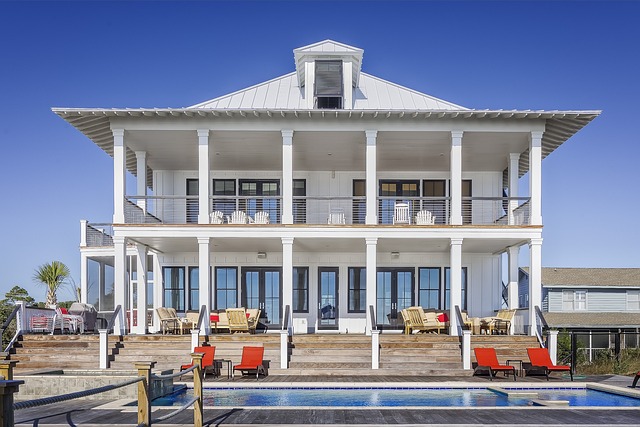When considering the purchase of an Executive Condominium (EC) in Singapore, potential buyers have a range of financing options to explore. Traditional bank loans offer fixed and floating interest rates, each with its own advantages and risks depending on market conditions and personal financial planning. The Special Housing Grant (SHG) and CPF savings are valuable resources for first-time homeowners, especially as they can be used to cover downpayments and reduce the financial burden of monthly mortgage payments. Additionally, the Central Provident Fund (CPF) can be utilized without incurring interest, making it a cost-effective option. The Housing & Development Board (HDB) also provides mortgage insurance schemes for eligible EC units and grants such as the CPF Housing Grant (CHG) and Enhanced CPF Housing Grant (ECHG) to assist first-time buyers. For those preferring private financing, loans from finance companies may offer lower initial down payments and flexible payment terms. With these diverse funding options available, an available EC in Singapore remains an accessible and attractive option for a wide range of potential homeowners.
navitating the dynamic landscape of property investment in Singapore, understanding the nuances of Executive Condominiums (ECs) is key for homeowners and investors alike. This article delves into the multifaceted world of EC financing options available to prospective buyers. From eligibility criteria to a detailed exploration of the CPF Housing Grant’s influence on EC financing, we guide you through each step. Explore traditional bank loans, compare fixed versus floating rates for your EC mortgage, and learn about innovative financing solutions that cater to diverse financial scenarios. Whether you’re an existing owner or considering investing in an available EC in Singapore, this comprehensive guide will equip you with the knowledge to make informed decisions on your housing journey.
- Understanding Executive Condominiums (ECs) in Singapore: A Comprehensive Guide
- Eligibility Criteria for Purchasing an Available EC in Singapore
- The CPF Housing Grant and Its Impact on EC Financing
- Traditional Bank Loans: Assessing Your Options for EC Financing
- Comparing Interest Rates: Fixed vs. Floating Rates for EC Mortgages
- Special Housing Grants for ECs in Singapore: What You Need to Know
- The Role of CPF Savings in Funding Your Executive Condo Purchase
- Innovative Financing Solutions and Alternatives for Prospective EC Owners in Singapore
Understanding Executive Condominiums (ECs) in Singapore: A Comprehensive Guide

In Singapore, Executive Condominiums (ECs) serve as a unique housing option for both singles and families who aspire to own a property but may not be ready for a private condo. These hybrid homes combine the features of both public and private housing, offering a middle-ground for upgraders. Prospective homeowners interested in available ECs in Singapore should note that these units are initially sold at subsidized rates to Singaporeans, with eligibility criteria that include income ceilings and other qualifications. After a certain period, typically five years, the majority of the EC transforms into a private condo, allowing for a smoother transition as the development matures.
The journey towards owning an EC begins with understanding the nuances of its eligibility criteria, which can be quite distinct from those of HDB flats or private properties. For instance, applicants must fulfill certain conditions such as income ceilings and may only purchase an EC within a specified duration after marriage or the birth of a child. Additionally, owners are required to sell their EC upon meeting the “minimum occupation period” of five years or when they turn 55 years old, whichever is earlier. Financing options for ECs mirror those of HDB flats but with variations tailored to this specific housing type. Prospective buyers can opt for bank loans, HDB loans, or a combination of both, subject to the loan-to-value (LTV) limits and eligibility criteria set by financial institutions and the Housing & Development Board (HDB). Understanding these financing options is crucial for a smooth transaction when purchasing an available EC in Singapore.
Eligibility Criteria for Purchasing an Available EC in Singapore

The CPF Housing Grant and Its Impact on EC Financing

In Singapore, the CPF Housing Grant (CHG) plays a significant role in enhancing the affordability and accessibility of Executive Condominiums (ECs) for eligible applicants. The CHG is a financial assistance scheme offered by the Central Provident Fund (CPF), which allows individuals to use their CPF savings towards the purchase of an EC. This grant can significantly reduce the initial outlay required, making it one of the most attractive Executive Condo financing options available in Singapore. For instance, first-time applicants who meet the necessary income criteria and are purchasing a resale EC may be entitled to substantial grants, which can cover a substantial portion of the purchase price. This not only eases the financial burden on homebuyers but also accelerates their path towards asset ownership within a structured housing ecosystem. The impact of the CHG on EC financing is profound, as it opens up opportunities for more Singaporeans to realize the dream of homeownership in a quality living environment that ECs provide. Prospective buyers considering available ECs in Singapore should thoroughly assess their eligibility for the CPF Housing Grant and explore how this grant can complement their financial planning for a property investment that is both sound and strategically timed within the property market’s dynamics.
Traditional Bank Loans: Assessing Your Options for EC Financing

In Singapore, Executive Condos (ECs) present a unique housing option for both singles and families. Prospective buyers looking to finance their EC purchase have a range of options at their disposal, with traditional bank loans being a popular choice. These loans are designed to cater to the specific financial needs associated with purchasing an EC, which is a hybrid of a public and private flat. When considering a traditional bank loan for an available EC in Singapore, it’s crucial to evaluate the various loan packages available, as they can differ significantly from one financial institution to another. Factors such as loan-to-value (LTV) ratios, interest rates, and tenure options are key aspects that should be carefully examined. Lenders typically offer different LTV ratios, which affect the down payment required; hence, understanding these ratios is essential for effective financial planning. Additionally, comparing the fixed, variable, and floating rate options can help you make an informed decision that aligns with your repayment capacity and risk appetite.
Furthermore, potential EC owners should also consider the total cost of ownership, which includes not just the purchase price and loan interest but also additional costs like legal fees, stamp duty, maintenance fees, and mortgage insurance premiums where applicable. The process of securing a bank loan for an available EC in Singapore is streamlined, with most banks offering a straightforward application process and clear guidelines on eligibility criteria. It’s advisable to engage multiple banks to explore the best possible financing deal, as this can significantly influence your long-term financial commitments. With a comprehensive understanding of the loan landscape and careful planning, securing an EC in Singapore through traditional bank loans is a viable path for those looking to balance affordability with the benefits of living in an executive condominium.
Comparing Interest Rates: Fixed vs. Floating Rates for EC Mortgages

When considering executive condominium (EC) financing options in Singapore, potential homeowners face a choice between fixed and floating interest rates for their mortgage. Fixed-rate mortgages offer the stability of a consistent interest rate throughout the loan’s tenure, providing predictability in monthly payments. This can be particularly advantageous for those who prefer budget certainty over the loan period. On the other hand, floating-rate mortgages tie your interest rate to market rates, which means your payment could rise or fall with economic conditions. While this might introduce some variability into your financial planning, it can also be beneficial if interest rates trend downward.
Prospective EC owners should weigh these options against the current financial climate and their own financial outlook. The decision to opt for a fixed or floating rate mortgage should be informed by one’s risk tolerance, market predictions, and the length of time they plan to hold onto the property. It’s also crucial to consider the loan-to-value (LTV) ratio and the available EC options in Singapore, as these factors can influence the interest rate you are offered. By carefully evaluating fixed versus floating rates, and understanding how each option aligns with your financial strategy, you can make an informed decision that suits your long-term financial goals.
Special Housing Grants for ECs in Singapore: What You Need to Know

In Singapore, the Special Housing Grant (SHG) is a financial assistance scheme designed to support eligible families, especially low-to-middle income households, in purchasing an Executive Condominium (EC). This grant is specifically tailored to cover the downpayment for a new EC and is capped at a certain amount. For prospective homeowners considering available ECs in Singapore, understanding the SHG is crucial as it can significantly reduce the initial outlay required. The grant amount a household is eligible for depends on the type of property being purchased, the size of the family, and the average monthly household income. Prospective buyers must meet certain criteria to qualify for this grant, including being first-time applicants for housing grants, Singapore Citizens, and not owning or having an equity interest in another flat. The SHG is a component of the government’s efforts to ensure that housing remains accessible to all citizens, especially with the availability of ECs as a housing option that falls between public housing and private condominiums. As such, understanding the intricacies of this grant can make a substantial difference in the affordability of an EC for eligible applicants. Potential buyers should thoroughly assess their eligibility and the associated terms and conditions to effectively leverage the SHG when purchasing an available EC in Singapore.
The Role of CPF Savings in Funding Your Executive Condo Purchase

When considering the purchase of an Executive Condominium (EC) in Singapore, potential homeowners often explore various financing options to complement their budget. One significant advantage for Singaporeans is the utilization of their Central Provident Fund (CPF) savings. The CPF is a comprehensive social security system that plays a pivotal role in housing finance. Prospective EC buyers can use their CPF Ordinary Account (OA) savings to finance the purchase, up to certain limits set by the CPF Board. This funding avenue is not only accessible but also offers a cost-effective solution as it is exempt from interest payments that would typically be incurred with traditional loans.
Moreover, the CPF savings can be leveraged to service the monthly mortgage payments for an EC, providing financial flexibility and reducing the overall reliance on external financing. The CPF Housing Grant (CHG) further assists eligible first-timer applicants by subsidizing their downpayment, thereby lowering the initial capital outlay. With available ECs in Singapore such as Parc Canberra, Riverfront Residences, and Piermont Grand, potential buyers with substantial CPF savings can significantly benefit from this funding method, making homeownership more attainable without the immediate need to liquidate assets or seek alternative loans. This aspect of using CPF savings for EC purchases is particularly advantageous given the current property market landscape in Singapore, where affordable yet quality housing options are in high demand.
Innovative Financing Solutions and Alternatives for Prospective EC Owners in Singapore

Prospective Executive Condominium (EC) owners in Singapore have a variety of innovative financing solutions and alternatives at their disposal to facilitate their purchase. Traditional bank loans remain a popular choice, with many local banks and financial institutions offering competitive interest rates and flexible repayment terms tailored for EC buyers. These loans are typically structured to accommodate the unique features of an EC, which transitions from being sold as a flat to a condominium after its residents have fulfilled the minimum occupation period.
Beyond conventional bank loans, there are other avenues such as mortgage insurance schemes provided by the Housing & Development Board (HDB) for eligible EC units. Additionally, with the introduction of the Enhanced CPF Housing Grant (ECHG), first-time EC buyers may benefit from significant financial support towards their purchase. For those seeking alternative options, private finance companies offer loan packages that could include lower initial down payments and the possibility of deferred payment schemes. These innovative financing solutions underscore the adaptability of the Singaporean property market to the evolving needs of homeowners, ensuring a diverse range of available ECs in Singapore can be accessed by eligible buyers with varying financial circumstances.



